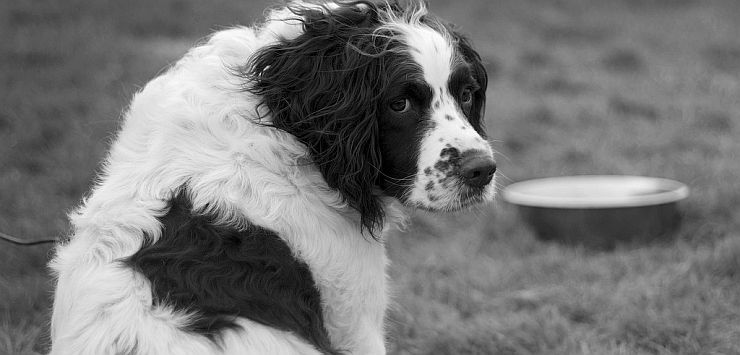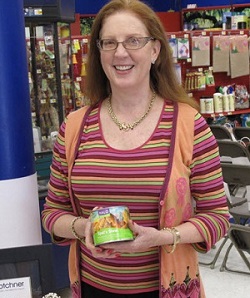
Read the label on your dog’s food, and you’ll see a section called “Guaranteed Analysis.” That’s called the “ingredient dec” (or “declaration”) in pet food manufacturing lingo. Listed there, along with all the ingredients, you’ll find percentages for moisture, crude fiber, crude fat, and crude protein.
Given how important protein is to our dog’s diet, many people think that “crude protein” refers to protein in its most basic, “crude” form. I used to think “crude protein” meant the total amount of protein – the “bottom line” number – that I could be sure was in this food and my dogs could absorb into their systems.
“Crude” is the confusing word
What the term “crude” actually refers to in pet food is the scientific method used to determine the nutrient content of your dog’s food. The protein content is actually determined not by looking at what forms of protein (fish, meat, chicken, etc) are in the food, but instead by analyzing the levels of nitrogen in the food as the method for calculating protein, just as the fat content is calculated by analyzing levels of lipids (fats). However, the source and quality of the protein is not considered in this number, nor whether it is truly bioavailable to the dog’s system for absorption.
Where did that protein come from?
The real bottom line about crude protein is the quality and the digestibility of the sources of that protein. While nutritional guidelines have been developed by the Association of American Feed Control Officials (AAFCO), the organization has no regulatory authority over pet food ingredients or manufacture. The quality of dog food varies based on the original ingredients and how they are prepared. The best advice is to feed your dog the highest-quality food you can afford from a company in which you have confidence in how they are creating their foods.
The difference between a premium food and budget food is often found in the quality and source of ingredients. Your best bet is not to look at scientific calculations of percentages but to select pet foods made with real, recognizable ingredients: whole meats—such as chicken, lamb, salmon, etc.—and whole vegetables, grains and vegetables or fruit.
We can get protein from many sources beyond meat
Dogs and humans are omnivores which means they can eat a combination of meats and plants. It’s also possible for a dog to thrive if fed a well-balanced, quality vegetarian diet. I’ve written before about how Halo’s vegan recipe dry and canned foods are a blessing to my vegetarian dog-owning friends. As the saying goes, “We are what we eat.” Wholesome nutrition is the key to health and happiness for you and your best friend.
 Tracie Hotchner is a nationally acclaimed pet wellness advocate, who wrote THE DOG BIBLE: Everything Your Dog Wants You to Know and THE CAT BIBLE: Everything Your Cat Expects You to Know. She is recognized as the premiere voice for pets and their people on pet talk radio. She continues to produce and host her own Gracie® Award winning NPR show DOG TALK® (and Kitties, Too!) from Peconic Public Broadcasting in the Hamptons after 9 consecutive years and over 500 shows. She produced and hosted her own live, call-in show CAT CHAT® on the Martha Stewart channel of Sirius/XM for over 7 years until the channel was canceled, when Tracie created her own Radio Pet Lady Network where she produces and co-hosts CAT CHAT® along with 10 other pet talk radio podcasts with top veterinarians and pet experts.
Tracie Hotchner is a nationally acclaimed pet wellness advocate, who wrote THE DOG BIBLE: Everything Your Dog Wants You to Know and THE CAT BIBLE: Everything Your Cat Expects You to Know. She is recognized as the premiere voice for pets and their people on pet talk radio. She continues to produce and host her own Gracie® Award winning NPR show DOG TALK® (and Kitties, Too!) from Peconic Public Broadcasting in the Hamptons after 9 consecutive years and over 500 shows. She produced and hosted her own live, call-in show CAT CHAT® on the Martha Stewart channel of Sirius/XM for over 7 years until the channel was canceled, when Tracie created her own Radio Pet Lady Network where she produces and co-hosts CAT CHAT® along with 10 other pet talk radio podcasts with top veterinarians and pet experts.
 Tracie also is the Founder and Director of the annual NY Dog Film Festival, a philanthropic celebration of the love between dogs and their people. Short canine-themed documentary, animated and narrative films from around the world create a shared audience experience that inspires, educates and entertains. With a New York City premiere every October, the Festival then travels around the country, partnering in each location with an outstanding animal welfare organization that brings adoptable dogs to the theater and receives half the proceeds of the ticket sales. Halo was a Founding Sponsor in 2015 and donated 10,000 meals to the beneficiary shelters in every destination around the country in 2016.
Tracie also is the Founder and Director of the annual NY Dog Film Festival, a philanthropic celebration of the love between dogs and their people. Short canine-themed documentary, animated and narrative films from around the world create a shared audience experience that inspires, educates and entertains. With a New York City premiere every October, the Festival then travels around the country, partnering in each location with an outstanding animal welfare organization that brings adoptable dogs to the theater and receives half the proceeds of the ticket sales. Halo was a Founding Sponsor in 2015 and donated 10,000 meals to the beneficiary shelters in every destination around the country in 2016.
Tracie lives in Bennington, Vermont – where the Radio Pet Lady Network studio is based – and where her 12 acres are well-used by her 2-girl pack of lovely, lively rescued Weimaraners, Maisie and Wanda.

